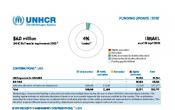Israel
Operation: Israel
Location
{"longitude":35,"latitude":33,"zoom_level":7,"iso_codes":"'ISR'"}
By clicking on the icons on the map, additional information is displayed.
The boundaries and names shown and the designations used on this map do not imply official endorsement or acceptance by the United Nations.
Key Figures
| 2020 planning figures | |
| 7,165 | people of concern will be provided with material assistance and psychosocial support |
| 3,678 | asylum-seekers will receive legal assistance |
| 1,200 | children at risk or with special needs will receive support |
| 900 | survivors of sexual and gender-based violence will receive psychosocial counselling |
| 200 | particularly vulnerable cases, including women and girls at risk, will be identified for resettlement |
| 2018 year-end results | |
| 509 | people received temporary humanitarian protection individually (various nationalities) or on a group basis (485 Sudanese) |
| 6 | asylum-seekers granted refugee status (5 Eritreans, 1 Nigerian) |
People of Concern
1%
Increase in
2019
2019
| 2019 | 54,653 |
| 2018 | 54,181 |
| 2017 | 55,250 |

[["Refugees",1789],["Refugee-like situation",14332],["Asylum-seekers",38490],["Stateless",42]]
Loading ...
Israel
< Back
2019
{"categories":[2015,2016,2017,2018,2019,2020],"budget":[3.2079391800000003,3.07990377,3.73197219,3.95707617,4.22396741,6.00000005],"expenditure":[2.75589838,2.67243925,2.86766417,2.7760111000000003,2.9348310499999997,null]}
{"categories":[2015,2016,2017,2018,2019,2020],"p1":[3.2079391800000003,3.07990377,3.73197219,3.95707617,4.22396741,6.00000005],"p2":[null,null,null,null,null,null],"p3":[null,null,null,null,null,null],"p4":[null,null,null,null,null,null]}
{"categories":[2015,2016,2017,2018,2019,2020],"p1":[2.75589838,2.67243925,2.86766417,2.7760111000000003,2.9348310499999997,null],"p2":[null,null,null,null,null,null],"p3":[null,null,null,null,null,null],"p4":[null,null,null,null,null,null]}
Loading ...
CHOOSE A YEAR
- 2015
- 2016
- 2017
- 2018
- 2019
- 2020
Year-end Overview
Plan Overview
Working environment
The protection environment in Israel remains restricted. National policies aim at incentivizing asylum-seekers to return to their countries of origin or to relocate to third countries, particularly for Eritrean and Sudanese asylum-seekers. Israel closed Holot Centre in early 2018, ending the relocation of asylum-seekers to detention-like conditions. UNHCR is advocating for the reinvigoration of the solutions strategy, which aims to find durable solutions for the majority of asylum-seekers, either through resettlement or integration in Israel.Throughout 2018, Supreme Court rulings have protected asylum-seekers from forced deportation to third countries. Political developments in countries of origin, such as Eritrea, are closely monitored, with judicial review also protecting against forced repatriation to an unsafe country.
Access to the labour market is tolerated. Access to health services is limited to emergencies and to private insurance (with a special subsidy scheme for children), whereas children have access to free primary and secondary education.
The civil society in Israel remains active. UNHCR will engage with the private sector in Israel, making links through vocational training activities, with the aim of improving access to livelihoods while also alleviating the negative impacts of densely populated urban areas where many people of concern reside.
Key Priorities
In 2019 UNHCR will focus on:- Strengthening the legal and policy framework through cooperation with legal partners to promote adherence to international law in policy, legislation and within the judiciary, including maintaining the Supreme Court’s role in reviewing legislation related to migrants and refugees.
- Maintaining resettlement for a minimum of 250 people a year and UNHCR adjudication for private sponsorships.
- Enabling the access of vulnerable asylum-seekers to basic services, including reproductive health.
- Supporting initiatives that would deliver durable solutions, including a return to the comprehensive solutions strategy agreement developed between Israel and UNHCR in 2018.
- Supporting safeguard including the supreme court rulings that protect refugees and asylum-seekers from involuntary repatriation, relocation within Israel, or deportation to third countries.
- Ensuring that voluntary returns take place in conditions of safety, voluntariness and dignity.














